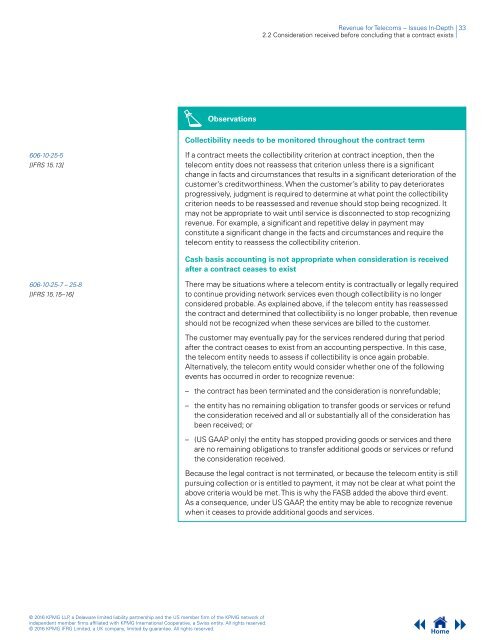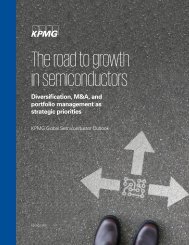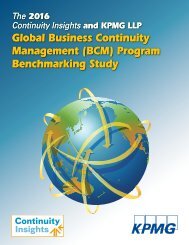Revenue for Telecoms
2cdncba
2cdncba
Create successful ePaper yourself
Turn your PDF publications into a flip-book with our unique Google optimized e-Paper software.
<strong>Revenue</strong> <strong>for</strong> <strong>Telecoms</strong> – Issues In-Depth | 33<br />
2.2 Consideration received be<strong>for</strong>e concluding that a contract exists |<br />
Observations<br />
Collectibility needs to be monitored throughout the contract term<br />
606-10-25-5<br />
[IFRS 15.13]<br />
If a contract meets the collectibility criterion at contract inception, then the<br />
telecom entity does not reassess that criterion unless there is a significant<br />
change in facts and circumstances that results in a significant deterioration of the<br />
customer’s creditworthiness. When the customer’s ability to pay deteriorates<br />
progressively, judgment is required to determine at what point the collectibility<br />
criterion needs to be reassessed and revenue should stop being recognized. It<br />
may not be appropriate to wait until service is disconnected to stop recognizing<br />
revenue. For example, a significant and repetitive delay in payment may<br />
constitute a significant change in the facts and circumstances and require the<br />
telecom entity to reassess the collectibility criterion.<br />
Cash basis accounting is not appropriate when consideration is received<br />
after a contract ceases to exist<br />
606-10-25-7 – 25-8<br />
[IFRS 15.15–16]<br />
There may be situations where a telecom entity is contractually or legally required<br />
to continue providing network services even though collectibility is no longer<br />
considered probable. As explained above, if the telecom entity has reassessed<br />
the contract and determined that collectibility is no longer probable, then revenue<br />
should not be recognized when these services are billed to the customer.<br />
The customer may eventually pay <strong>for</strong> the services rendered during that period<br />
after the contract ceases to exist from an accounting perspective. In this case,<br />
the telecom entity needs to assess if collectibility is once again probable.<br />
Alternatively, the telecom entity would consider whether one of the following<br />
events has occurred in order to recognize revenue:<br />
– the contract has been terminated and the consideration is nonrefundable;<br />
– the entity has no remaining obligation to transfer goods or services or refund<br />
the consideration received and all or substantially all of the consideration has<br />
been received; or<br />
– (US GAAP only) the entity has stopped providing goods or services and there<br />
are no remaining obligations to transfer additional goods or services or refund<br />
the consideration received.<br />
Because the legal contract is not terminated, or because the telecom entity is still<br />
pursuing collection or is entitled to payment, it may not be clear at what point the<br />
above criteria would be met. This is why the FASB added the above third event.<br />
As a consequence, under US GAAP, the entity may be able to recognize revenue<br />
when it ceases to provide additional goods and services.<br />
© 2016 KPMG LLP, a Delaware limited liability partnership and the US member firm of the KPMG network of<br />
independent member firms affiliated with KPMG International Cooperative, a Swiss entity. All rights reserved.<br />
© 2016 KPMG IFRG Limited, a UK company, limited by guarantee. All rights reserved.<br />
Home







